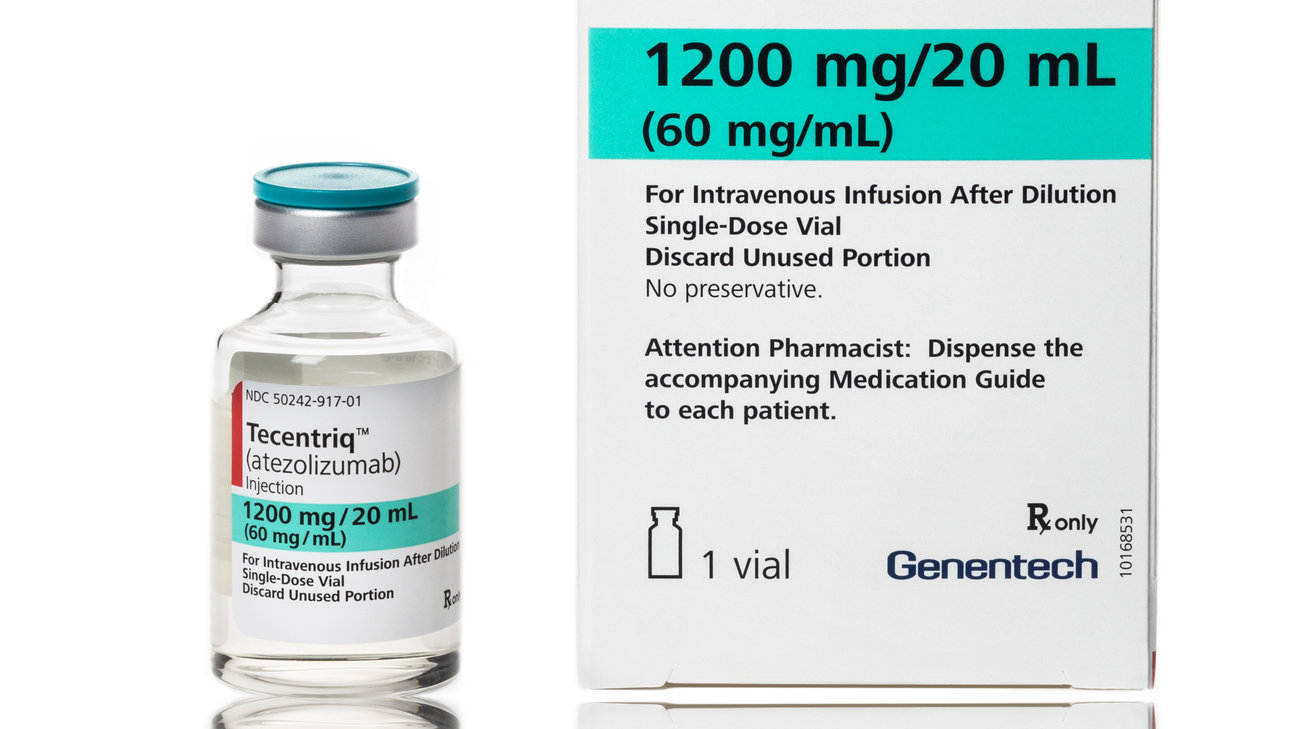Tecentriq (Atezolizumab) vs Xeloda ()
Tecentriq (Atezolizumab) vs Xeloda ()
Tecentriq (Atezolizumab) is an immune checkpoint inhibitor specifically designed to target and block the PD-L1 protein on cancer cells, thereby enhancing the body's immune response against the cancer. It is often used in the treatment of various types of cancers, including non-small cell lung cancer, small cell lung cancer, urothelial carcinoma, and triple-negative breast cancer. On the other hand, Xeloda (Capecitabine) is an oral chemotherapy drug that is converted into 5-fluorouracil (5-FU) in the body, which interferes with DNA production and kills cancer cells, commonly used for colorectal cancer and breast cancer. When deciding between these two medications, it is crucial to consider the type of cancer being treated, the stage of the disease, the patient's overall health, and previous treatments, as each drug has specific indications and mechanisms of action. A healthcare professional can provide personalized advice based on the patient's unique medical history and the specific characteristics of their cancer.
Difference between Tecentriq and Xeloda
| Metric | Tecentriq (Atezolizumab) | Xeloda () |
|---|---|---|
| Generic name | Atezolizumab | Capecitabine |
| Indications | Urothelial carcinoma, non-small cell lung cancer, triple-negative breast cancer, hepatocellular carcinoma, and others | Metastatic colorectal cancer, metastatic breast cancer, gastric cancer, and others |
| Mechanism of action | PD-L1 inhibitor, enhancing T-cell mediated immune response against cancer cells | Prodrug that is enzymatically converted to 5-fluorouracil (5-FU) in the body, which inhibits DNA synthesis and cell division |
| Brand names | Tecentriq | Xeloda |
| Administrative route | Intravenous infusion | Oral |
| Side effects | Fatigue, decreased appetite, nausea, urinary tract infections, fever, and others | Diarrhea, hand-foot syndrome, nausea, vomiting, fatigue, and others |
| Contraindications | History of severe hypersensitivity to atezolizumab or any of its excipients | Hypersensitivity to capecitabine or fluorouracil, dihydropyrimidine dehydrogenase (DPD) deficiency |
| Drug class | Monoclonal antibody, Immune checkpoint inhibitor | Antimetabolite, Fluoropyrimidine |
| Manufacturer | Genentech (Roche) | Roche |
Efficacy
Tecentriq (Atezolizumab) in Breast Cancer Treatment
Tecentriq (Atezolizumab) is an immune checkpoint inhibitor that has shown efficacy in the treatment of triple-negative breast cancer (TNBC), which is a type of breast cancer that lacks estrogen and progesterone receptors and does not overexpress the HER2 protein. Tecentriq has been studied in combination with chemotherapy and has been found to improve outcomes in patients with this aggressive form of breast cancer. Specifically, the IMpassion130 trial demonstrated that the addition of Tecentriq to nab-paclitaxel significantly improved progression-free survival in patients with metastatic or unresectable locally advanced TNBC.
Furthermore, the use of Tecentriq in the treatment of breast cancer has been associated with an improvement in overall survival, particularly in patients whose tumors express the PD-L1 protein. This biomarker is used to identify patients who are more likely to respond to immune checkpoint inhibitors like Tecentriq. The results from clinical trials suggest that patients with PD-L1-positive tumors derive the most benefit from Tecentriq, highlighting the importance of biomarker testing in the management of breast cancer.
Xeloda (Capecitabine) in Breast Cancer Treatment
Xeloda (Capecitabine) is an oral chemotherapy drug that is converted to 5-fluorouracil (5-FU) in the body, where it inhibits DNA synthesis and slows the growth of cancer cells. Xeloda has been used as a treatment for metastatic breast cancer, particularly in patients who have not responded to other chemotherapy treatments. In clinical trials, Xeloda has been shown to be effective as a single agent in improving response rates and delaying disease progression in metastatic breast cancer patients.
Additionally, Xeloda has been studied in combination with other chemotherapy agents and targeted therapies for the treatment of breast cancer. When used in combination with agents such as docetaxel, Xeloda has demonstrated improved efficacy in terms of overall response rate and progression-free survival compared to chemotherapy alone. This suggests that Xeloda can play a valuable role in combination regimens for the management of advanced breast cancer, offering an additional therapeutic option for patients who have progressed on standard treatments.
Regulatory Agency Approvals
Tecentriq
-
European Medical Agency (EMA), European Union

-
Food and Drug Administration (FDA), USA

-
Health Canada

-
Pharmaceuticals and Medical Devices Agency (PMDA), Japan

-
Therapeutic Goods Administration (TGA), Australia

-
Medsafe (NZ)

Xeloda
-
European Medical Agency (EMA), European Union

-
Food and Drug Administration (FDA), USA

Access Tecentriq or Xeloda today
If Tecentriq or Xeloda are not approved or available in your country (e.g. due to supply issues), you can access them via Everyone.org.
How it works

Make an enquiry
Choose the medicine you want to buy, answer a couple of questions, and upload your prescription to speed things up. We’ll get back to you within 24 hours.


Make an enquiry
Choose the medicine you want to buy, answer a couple of questions, and upload your prescription to speed things up. We’ll get back to you within 24 hours.


Breeze through the paperwork
We'll guide you through the required documents for importing unapproved medicine, ensuring you have all the necessary information.


Get a personalized quote
We’ll prepare a quote for you, including medicine costs and any shipping, administrative, or import fees that may apply.


Receive your medicine
Accept the quote and we’ll handle the rest - sourcing and safely delivering your medicine.

Some text on this page has been automatically generated. Speak to your physician before you start a new treatment or medication.
Let's talk
If you have any questions, call us or send us a message through WhatsApp or email:
Contact us




